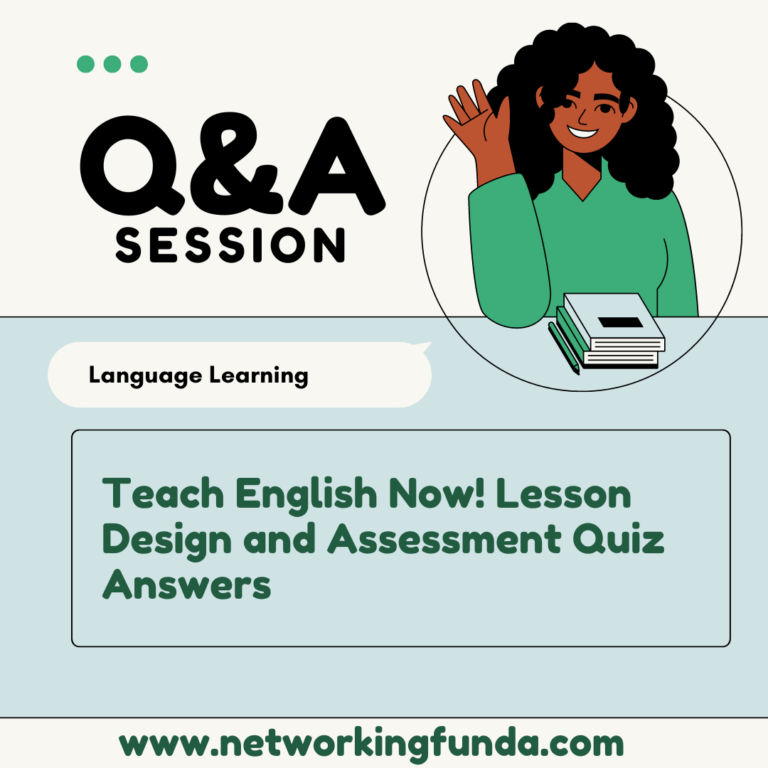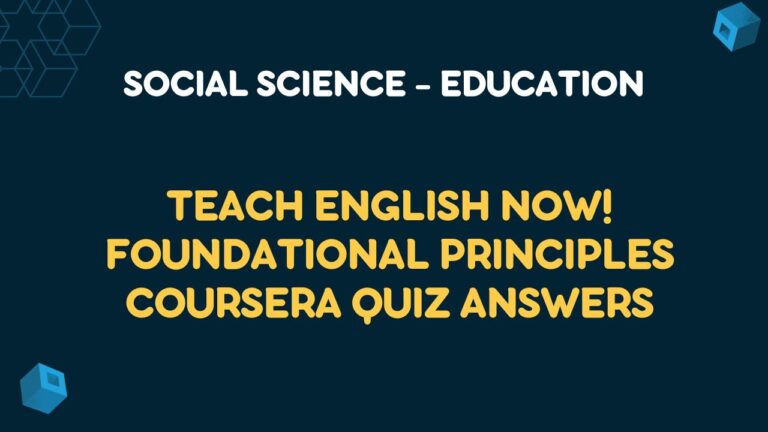Get All Weeks Qualitative Research Methods Coursera Quiz Answers
Table of Contents
Week 03: Qualitative Research Methods Coursera Quiz Answers
Quiz 1: Practice quiz
Q1. Phenomenology studies the conscious experience of something as experienced by the researcher only.
[expand title=View Answer] False [/expand]
Q2. Why are deviant cases interesting to delve in for qualitative researchers?
[expand title=View Answer] Deviant cases can provide additional support for a theory[/expand]
Q3. Which of the following set of criteria of qualitative research is most likely to be used in qualitative research with a more objectivist social ontology?
[expand title=View Answer] The alternative sets in which we focus on Trustworthiness and Authenticity. [/expand]
Quiz 2: Midterm exam
Q1. Why do qualitative methodologists talk about serendipity in qualitative research, whereas in more quantitative research there is less stress on it?
[expand title=View Answer] Because there is more room for flexibility in qualitative research, it enlarges the possibility of accidental findings. [/expand]
.
Q2. Which of the following statements is false?
[expand title=View Answer]An ontological position entails a view of knowledge[/expand]
Q3. What is the main objective of ethnography?
[expand title=View Answer] To understand the culture, norms, values and social environment of a group [/expand]
Q4. Pragmatism requires the researcher to be exclusively concerned with practical knowledge.
[expand title=View Answer] False[/expand]
Q5. Participant observation does not provide:
[expand title=View Answer] A single type of data [/expand]
Q6. Thick description is an in-depth and contextual description in order to represent reality as factual as possible.
[expand title=View Answer] True [/expand]
Q7. Which of the following statements is false:
[expand title=View Answer] Deviant cases are simply exceptional [/expand]
Q8. Theoretical saturation means that no additional data are being found whereby the sociologist can develop properties of the category.
[expand title=View Answer]True [/expand]
Q9. Which of the following is not a critique of triangulation?
[expand title=View Answer] It is impossible to compare an interview with an observation because you move away from the social context of both methods [/expand]
Q10. Abduction works like this:
The surprising fact, C, is observed; But if A were true, C would be a matter of course, hence, A is true
[expand title=View Answer] True [/expand]
Q11. Abduction in qualitative research is:
[expand title=View Answer]A creative and appealing form of guessing [/expand]
Q12. Qualitative researchers tend to focus strongly on details as well as context. What is not an issue with the focus on details?
[expand title=View Answer] A focus on details is too much quick and dirty work [/expand]
Q13. Qualitative researchers see the use of sensitizing concepts as key to good theoretical understanding, why?
[expand title=View Answer] A sensitizing concept gives a temporary sense of reference and guidance in approaching empirical instances [/expand]
Q14. In the lecture, it was argued that reflexivity could be seen as a confession on three levels. Which level was not considered in the lecture?
[expand title=View Answer]Ethical [/expand]
Q15. Generalization is a big issue in more quantitative social research. In qualitative research:
[expand title=View Answer] Many qualitative researchers generalize less to statistical representation but more to variation [/expand]
Q16. Which of the following forms is not a form of theoretical saturation?
[expand title=View Answer] Saturation by using complete representation[/expand]
Q17. In naturalism, social researchers are considered as part of the social world they study.
[expand title=View Answer] True [/expand]
Q18. Which epistemological position fits this quote:
[expand title=View Answer] Interpretivist position [/expand]
“Social reality has a specific meaning and relevance structure for the beings living, acting, and thinking within it”
Q19. Which of the following philosophical positions places “natural” knowledge between brackets:
[expand title=View Answer] Phenomenology[/expand]
Q20. Which of the following methods is central to Ethnography?
[expand title=View Answer] Participant observation [/expand]
Q21. Dramaturgical sociology as an observational paradigm entails:
[expand title=View Answer]Focusing on how people act, interact and form relationships to determine meaning[/expand]
Q22. Selective observation (Spradley, 1980) is focused on comparisons and nuances.
[expand title=View Answer] True [/expand]
Q23. A researcher can win authority based on rhetorics only, by showing the hardships he or she went through in the research.
[expand title=View Answer] False [/expand]
Q24. The problem with a focus is:
[expand title=View Answer] Confirmation bias [/expand]
Q25. People use Symbolic transformation (Lofland, 1973) as a way of privatizing public space
[expand title=View Answer] True [/expand]
Q26. What to note when taking field notes in an observational study depends on:
[expand title=View Answer] Your research question[/expand]
Q27. A woman is screaming at her partner in the supermarket. They are a fighting couple.
This is an example of an interpretation
[expand title=View Answer] False [/expand]
Q28. When working with multiple interviewers on the same study, a structured coding scheme enhances:
[expand title=View Answer] Internal reliability [/expand]
Q29. Which of the following is not a type of triangulation?
[expand title=View Answer] Triangulation of ontology[/expand]
Q30. In qualitative research following strict procedures is crucial
[expand title=View Answer] False[/expand]
Week 8: Final Exam Quiz Answers
Q1. Which of the following is not a vision of interviewing?
[expand title=View Answer] Interview as a topic [/expand]
Q2. Which of the following types are types of Grounded Theories?
[expand title=View Answer] Grand and middle-range theories[/expand]
Q3. What is most important about rapport in interviewing?
[expand title=View Answer] It increases the chance that the interviewee will participate in future research [/expand]
Q4. What is used by definition in a semi-structured qualitative interview?
[expand title=View Answer] The predefined sequence of questions [/expand]
Q5. Which of the following three aspects are used in all approaches in qualitative analysis?
[expand title=View Answer] Interpreting, describing, and analyzing [/expand]
Q6. Analytic Induction and Grounded Theory are both rather inductive methods:
[expand title=View Answer] False [/expand]
Q7. What is the main objective of Grounded Theory?
[expand title=View Answer] To develop a theory based on data[/expand]
Q8. Why is coding in Grounded Theory so important?
[expand title=View Answer] Coding enhances the quality of your research because codes are short summaries [/expand]
Q9. According to Charmaz the ontological position of a Grounded Theory researcher should be objectivist
[expand title=View Answer] False [/expand]
Q10. Some approaches of qualitative analysis are iterative. What does iterative mean?
[expand title=View Answer] The researcher goes back and forward between data and theoretical claims [/expand]
Q11. To ensure the best quality of gathered information using open interviews, the best probing tactic is by definition:
[expand title=View Answer] Challenging [/expand]
Q12. Reflexivity is not a part of the writing process
[expand title=View Answer] False[/expand]
Q13. Mixing methods could be useful because:
[expand title=View Answer] Quantitative methods and qualitative methods could complement each other [/expand]
Q14. There are five focal points in ethics, Which of the following is not a focal point:
[expand title=View Answer] Utilization[/expand]
Q15. An interview is a conversation with a purpose.
[expand title=View Answer] True [/expand]
Q16. The purpose of the interview as a topic is:
[expand title=View Answer] To obtain useful information about events and facts of the life of the interviewee [/expand]
Q17. Behavior in interviews can be oriented towards:
[expand title=View Answer] The interviewee as a person [/expand]
Q18. As a result of Oakley’s (1981) critique of the interview as a power game, in the literature, the emphasis shifted towards:
[expand title=View Answer]Stronger focus on rapport, trust, and reciprocity [/expand]
Q19. Probing means responding to replies from the interviewee with the aim of asking as many questions as possible within a limited amount of time.
[expand title=View Answer] False [/expand]
Q20. Which of the following statements about content analysis and analytic induction is true?
[expand title=View Answer]Content analysis is a more sequential approach [/expand]
Q21.Framework analysis can be seen a version of content analysis.
[expand title=View Answer] True[/expand]
Q22. Which of the following characteristics is not a key characteristic of Framework analysis
[expand title=View Answer] Framework analysis expands data [/expand]
Q23. The difference between Framework Analysis and Content Analysis is:
[expand title=View Answer] Framework analysis reduces data through summaries and synthesis, whereas content analysis does not. [/expand]
Q24. According to Karl Popper (1959), verification is crucial for the scientific method.
[expand title=View Answer] False [/expand]
Q25. One of the objectives of qualitative writing is to account for the author’s choices in the application of research methods.
[expand title=View Answer]True [/expand]
Q26. A realist tale involves:
[expand title=View Answer] A narrative format[/expand]
Q27. A common weakness of quite some published qualitative research studies is:
[expand title=View Answer] Lack of transparency [/expand]
Q28. Ethical considerations are important in qualitative research:
[expand title=View Answer] Because researchers have a responsibility towards the people under study[/expand]
Q29. Self-doubt is the enemy of any researcher.
[expand title=View Answer] False [/expand]
Q30. If you consider the interview as a topic, rather than a tunnel, you tend
to have a more
[expand title=View Answer] Constructivist view of the interview [/expand]
Get All Course Quiz Answers of Methods and Statistics in Social Sciences Specialization
Qualitative Research Methods Coursera Quiz Answers
Inferential Statistics Coursera Quiz Answers


